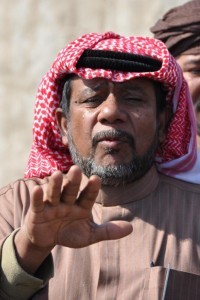
The 1,300 gypsies of Al-Zuhoor Village are among the most vulnerable minorities in Iraq’s southern Diwanyah Province. They have faced discrimination since arriving in the 1920s. In 2004, their village was razed by the Jaysh al-Mahdi militia, who bulldozed their mud-brick homes and the leveled the school.
Over the past seven years, villagers have slowly returned even though Al-Zuhoor has no electricity, running water, sewage disposal, medical facilities or classrooms. Today, with assistance from USAID, Al-Zuhoor does have a Community Action Group (CAG), a committee of four women and eight men who have prioritized their village’s needs and pressed the local government to establish basic services.
“We need electricity and education,” says CAG member Abbas Hussein Ayiz. “We emphasize electricity because to do other projects – to run schools and workshops – we need electricity.”
Forming a CAG was a huge step for the residents of Al-Zuhoor, who are mostly unemployed and uneducated. They had no experience in community organization and were unfamiliar with the workings of government even though they are Iraqi citizens.
The gypsies, who migrated from Central Europe to the Arabian Peninsula at the end of the Ottoman Empire, are seen by many as outsiders even thought they have lived in Iraq for nearly a century. They cannot find work and do not own farmland. A police checkpoint keeps non-residents from entering the village.
“We’ve wanted to do for ourselves. But we needed a push,” says Abbas, referring to USAID’s help establishing the CAG and promising Community Action Program support funds once priorities were established.
The community has received the local government’s approval for connection to the electrical grid. USAID will provide the wire and transformers; the villagers will provide the labor. USAID’s efforts have begun dialogue between the community and the local government encouraged the community to advocate for its needs, and the government to support Al-Zuhoor’s residents.







Comment
Make a general inquiry or suggest an improvement.